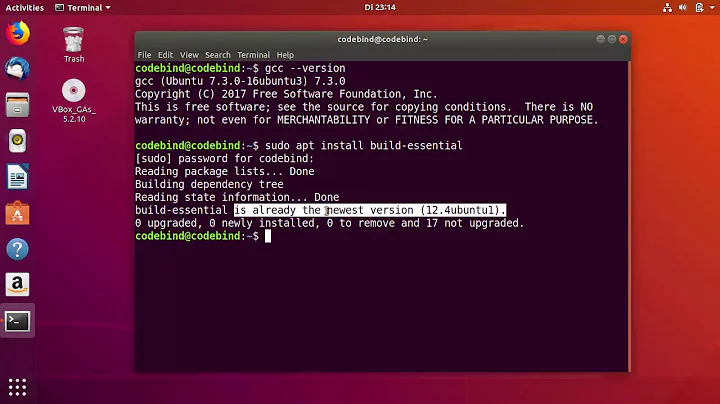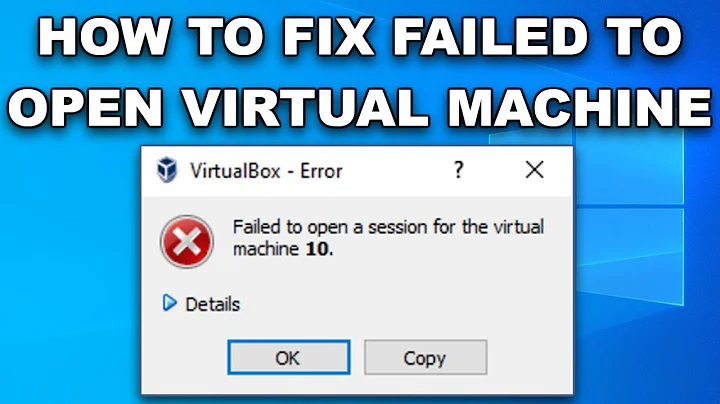Command to determine whether Ubuntu is running in a virtual machine?
Solution 1
virt-what
is a shell script which can be used to detect if the program
is running in a virtual machine.
The program prints out a list of "facts" about the virtual machine, derived from heuristics. One fact is printed per line.
If nothing is printed and the script exits with code 0 (no error), then it can mean either that the program is running on bare-metal or the program is running inside a type of virtual machine which we don't know about or cannot detect.
SUMMARY
sudo virt-what [facts]
aws Amazon Web Services cloud guest.
Status: contributed by Qi Guo.
bhyve
This is a bhyve (FreeBSD hypervisor) guest.
Status: contributed by Leonardo Brondani Schenkel.
docker
This is a Docker container.
Status: confirmed by Charles Nguyen
hyperv
This is Microsoft Hyper-V hypervisor.
Status: confirmed by RWMJ
ibm_power-kvm
This is an IBM POWER KVM guest.
Status: contributed by Adrian Likins.
ibm_power-lpar_shared
ibm_power-lpar_dedicated
This is an IBM POWER LPAR (hardware partition) in either shared or
dedicated mode.
Status: contributed by Adrian Likins.
ibm_systemz
This is an IBM SystemZ (or other S/390) hardware partitioning
system. Additional facts listed below may also be printed.
ibm_systemz-direct
This is Linux running directly on a IBM SystemZ hardware
partitioning system.
This is expected to be a highly unusual configuration - if you see
this result you should treat it with suspicion.
Status: not confirmed
ibm_systemz-lpar
This is Linux running directly on an LPAR on an IBM SystemZ hardware
partitioning system.
Status: confirmed by Thomas Huth
ibm_systemz-zvm
This is a z/VM guest running in an LPAR on an IBM SystemZ hardware
partitioning system.
Status: confirmed by RWMJ using a Fedora guest running in z/VM
ibm_systemz-kvm
This is a KVM guest running on an IBM System Z hardware system.
Status: contributed by Thomas Huth
ldoms
The guest appears to be running on an Linux SPARC system with Oracle
VM Server for SPARC (Logical Domains) support.
Status: contributed by Darren Kenny
ldoms-control
The is the Oracle VM Server for SPARC (Logical Domains) control
domain.
Status: contributed by Darren Kenny
ldoms-guest
The is the Oracle VM Server for SPARC (Logical Domains) guest
domain.
Status: contributed by Darren Kenny
ldoms-io
The is the Oracle VM Server for SPARC (Logical Domains) I/O domain.
Status: contributed by Darren Kenny
ldoms-root
The is the Oracle VM Server for SPARC (Logical Domains) Root domain.
Status: contributed by Darren Kenny
linux_vserver
This is printed for backwards compatibility with older virt-what
which could not distinguish between a Linux VServer container guest
and host.
linux_vserver-guest
This process is running in a Linux VServer container.
Status: contributed by Barış Metin
linux_vserver-host
This process is running as the Linux VServer host (VxID 0).
Status: contributed by Barış Metin and Elan Ruusamäe
lxc This process is running in a Linux LXC container.
Status: contributed by Marc Fournier
kvm This guest is running on the KVM hypervisor using hardware
acceleration.
Note that if the hypervisor is using software acceleration you
should *not* see this, but should see the "qemu" fact instead.
Status: confirmed by RWMJ.
lkvm
This guest is running on the KVM hypervisor using hardware
acceleration, and the userspace component of the hypervisor is lkvm
(a.k.a kvmtool).
Status: contributed by Andrew Jones
openvz
The guest appears to be running inside an OpenVZ or Virtuozzo
container.
Status: contributed by Evgeniy Sokolov
ovirt
The guest is running on an oVirt node. (See also "rhev" below).
Status: contributed by RWMJ, not confirmed
parallels
The guest is running inside Parallels Virtual Platform (Parallels
Desktop, Parallels Server).
Status: contributed by Justin Clift
powervm_lx86
The guest is running inside IBM PowerVM Lx86 Linux/x86 emulator.
Status: data originally supplied by Jeffrey Scheel, confirmed by
Yufang Zhang and RWMJ
qemu
This is QEMU hypervisor using software emulation.
Note that for KVM (hardware accelerated) guests you should *not* see
this.
Status: confirmed by RWMJ.
rhev
The guest is running on a Red Hat Enterprise Virtualization (RHEV)
node.
Status: confirmed by RWMJ
uml This is a User-Mode Linux (UML) guest.
Status: contributed by Laurent Léonard
virt
Some sort of virtualization appears to be present, but we are not
sure what it is. In some very rare corner cases where we know that
virtualization is hard to detect, we will try a timing attack to see
if certain machine instructions are running much more slowly than
they should be, which would indicate virtualization. In this case,
the generic fact "virt" is printed.
virtage
This is Hitachi Virtualization Manager (HVM) Virtage hardware
partitioning system.
Status: data supplied by Bhavna Sarathy, not confirmed
virtualbox
This is a VirtualBox guest.
Status: contributed by Laurent Léonard
virtualpc
The guest appears to be running on Microsoft VirtualPC.
Status: not confirmed
vmm This is a vmm (OpenBSD hypervisor) guest.
Status: contributed by Jasper Lievisse Adriaanse.
vmware
The guest appears to be running on VMware hypervisor.
Status: confirmed by RWMJ
xen The guest appears to be running on Xen hypervisor.
Status: confirmed by RWMJ
xen-dom0
This is the Xen dom0 (privileged domain).
Status: confirmed by RWMJ
xen-domU
This is a Xen domU (paravirtualized guest domain).
Status: confirmed by RWMJ
xen-hvm
This is a Xen guest fully virtualized (HVM).
Status: confirmed by RWMJ
Sorry but this is your GUY.... ;)
Solution 2
Run lspci and check for the string 'VirtualBox'.
You could run lspci | grep VirtualBox
You could also run lsusb and check the string 'VirtualBox'. Such as lsusb | grep VirtualBox
Also dmesg works, run dmesg | grep VirtualBox or dmesg | grep virtual
Solution 3
imvirt (not installed by default but available in in universe repository)
Related videos on Youtube
Nathan Osman
Email: [email protected] I am both an Ubuntu user and Ubuntu member. By profession, I am a software developer and I work with C++, Python, and (more recently) Go. I enjoy tinkering with different things like motion tracking in Blender, creating an Android app for time-lapse photography, or writing Linux kernel modules. - 2buntu - community blog that I sometimes contribute to - NitroShare - a cross-platform network file transfer utility - REST Easy - Firefox add-on for analyzing HTTP responses
Updated on September 18, 2022Comments
-
Nathan Osman over 1 year
Is there a command or tool that can be used to determine whether Ubuntu is running as a guest within a virtualization program such as VirtualBox or Qemu or whether it is running on the bare metal?
-
Joe P over 12 yearsAt least one virtualbox message may appear on a host running virtualbox guests, so I'd drop the dmesg option. But lspci and lsusb are good.
-
Joe P over 12 yearsI think command line solutions are better than installing packages. If you have superuser privileges on a system (to install packages) are you likely to be unsure if it's virtualised or not?
-
David almost 12 years@JoeP You're right - except... What if you're running a script on all of your machines and it needs to know whether the host is virtualized or not?
![[SOLVED] How To Fix The "No Space Left on Device" Error On Linux In A VM](https://i.ytimg.com/vi/-APw5Y9ow6s/hqdefault.jpg?sqp=-oaymwEcCOADEI4CSFXyq4qpAw4IARUAAIhCGAFwAcABBg==&rs=AOn4CLBi_DdgzVhkoJBS0PhC1bOD8jaVpA)



